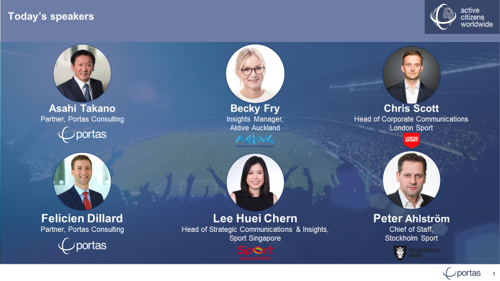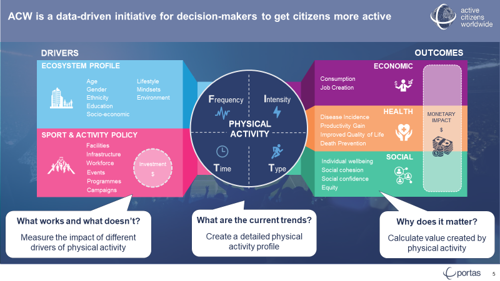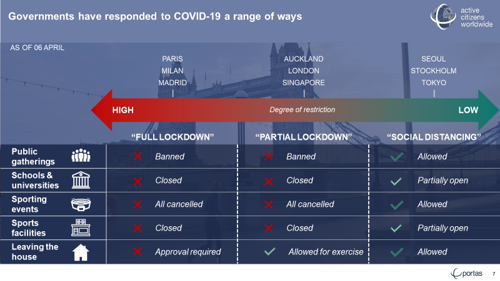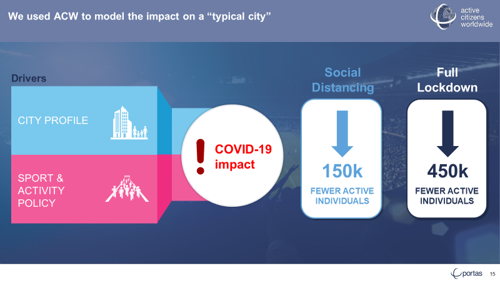As the COVID-19 pandemic spread globally during Q1 2020, national and local governments put in place social distancing measures to help slow the spread of the virus, to ‘buy’ time to fight the disease and plan for a new status-quo. The types of measures taken have varied broadly by geography as a function of a) the progression of the virus locally; b) local cultural norms and behaviours; c) economic realities; and d) local leaderships’ chosen approaches. The resulting impact on sports and physical activity habits have been immediate and significant.
Together with our Active Citizens’ Worldwide (ACW[1]) partners (London Sport, Stockholm Stad, Sport Singapore and Aktive Auckland), we conducted The ACW Webinar on 9 April, providing an opportunity for sports program decision makers from these cities to share how they have adapted to COVID-19 containment measures to help maintain citizens’ physical activity habits and utilise physical activity as a positive outlet in times of confinement, and to discuss the potential impact of social distancing on physical activity levels and the resultant economic, health and social effects.

The webinar addressed 2 questions:
- What is the expected impact of COVID-19 on sport and physical activity participation?
- How are sport leaders across the world ensuring citizens stay fit and active in the wake of COVID-19?
The ACW leadership firstly shared new analysis leveraging data from the global network that looks at the impact of COVID-19:
The ACW analytical framework is based on a unique dataset that allowed us to create a combined and blended city model:

A range of input variables was used to create scenarios and reflect the range of social distancing measures in place:

The outputs were modelled on a normalised city profile of 1million inhabitants

Some interesting actions highlighted by the city leaders are:
London:
- Leveraging strengths in digital, by working with start-ups to establish products which encourage physical activity in a lockdown
- Supporting national campaigns led by Sport England to encourage sport and physical activity at home during a lockdown
- Partnering with national funding agencies to ensure the right allocation for community sports related entities in a post-lockdown environment
Stockholm:
- Relaunching the “Stockholm Gym” campaign, which encourages people to use regular household items as weights
- Part-funding an initiative by the Swedish Orienteering Federation, which have released city maps that people can use while they walk and run
Singapore:
- Launching a new employment and training programme to support workers in the sector and beyond, who have been affected by the pandemic
- Providing grants for businesses who encourage employees to stay active at home along with their families
- Developing future-ready models, such as a virtual sports centre which collects data on individuals’ behaviors and preferences to inform decisions on how sports and physical activity can adapt to the ‘new-normal’ way of living
Auckland:
- Initiating a #StayActiveAKL campaign, encouraging all segments of the population from families to professional athletes to stay active at home, maintain health and well-being and stay united in the fight against COVID-19
- Launching a 6-point support plan across Legal, Capability development, Member engagement and retention, HR, Mental Health and Accounting / Finance to support the local sports and physical activity economy
A summary of the insights and implications can be found in the April 2020 ACWebinar Presentation.
A recorded summary of the webinar can be accessed here:
[1] Active Citizens Worldwide (ACW) is a global programme set up to help decision makers across the world measure, analyse and understand the drivers of physical activity, exercise and sports amongst citizens. ACW uses data and analytics to provide decision makers with better knowledge, insights and ideas. It helps improve and transform physical activity through stakeholder collaboration, best-practice sharing and global benchmarking.
